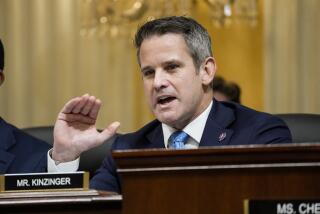Panetta says Afghan progress slower than expected
- Share via
Reporting from Washington — Days after President Obama installed a new U.S. military commander in Afghanistan, CIA Director Leon E. Panetta acknowledged Sunday that progress in the war has been “harder” and “slower than I think anyone anticipated.”
Top U.S. officials have acknowledged the difficulty the administration could face as it seeks to follow through on Obama’s pledge to begin drawing down troops in July 2011. If progress continues to lag, Obama is likely to face intensified pressure from Army Gen. David H. Petraeus, the commander-designate, not to draw down quickly, as well as a countervailing push by Vice President Joe Biden to switch to a smaller military footprint.
A debate over the administration’s war strategy is already underway, as Democratic and Republicans lawmakers clashed Sunday over whether Obama should rethink his pledge now that a new commander will oversee the war.
“I’m against a timetable,” Sen. John McCain of Arizona, the top Republican on the Senate Armed Services Committee, said on NBC’s “Meet the Press.”
Warning that a timetable emboldens the enemy to wait for Americans to depart, he added, “A high-ranking Taliban prisoner said, ‘You’ve got the watches and we’ve got the time.’ ”
But Sen. Carl Levin (D-Mich.), the committee chairman, said a timetable is crucial to show “urgency to the Afghan government that they must take responsibility … for their own security.”
“The only way you get things done is by setting dates,” Levin said on CBS’ “Face the Nation.”
The dispute over the start of the U.S. withdrawal is likely to be a prominent issue Tuesday when Petraeus faces senators in a hearing on his confirmation. Petraeus, now head of all U.S. forces in the Middle East, was chosen for the top post in Afghanistan after the removal of Army Gen. Stanley A. McChrystal for comments critical of civilian leaders in a magazine article.
In an interview with ABC News’ “This Week,” Panetta defended the administration strategy and said the key would be to build up Afghan army and police units so that they could take over from U.S. troops.
But few experts expect the Afghan security forces to be ready by July 2011.
“This is a very tough fight that we are engaged in,” Panetta said. “It is going to take the Afghan army and police to be able to accept the responsibility that we pass on to them. That’s going to be the key.”
Panetta offered a mixed assessment of the strength of the Taliban, contending that its leaders in Pakistan had been weakened but that the movement’s ability to carry out attacks had increased.
“In some areas with regards to some of their directed violence, they seem to be stronger, but the fact is, we are undermining their leadership, and that I think is moving in the right direction,” he said.
More to Read
Get the L.A. Times Politics newsletter
Deeply reported insights into legislation, politics and policy from Sacramento, Washington and beyond. In your inbox twice per week.
You may occasionally receive promotional content from the Los Angeles Times.












